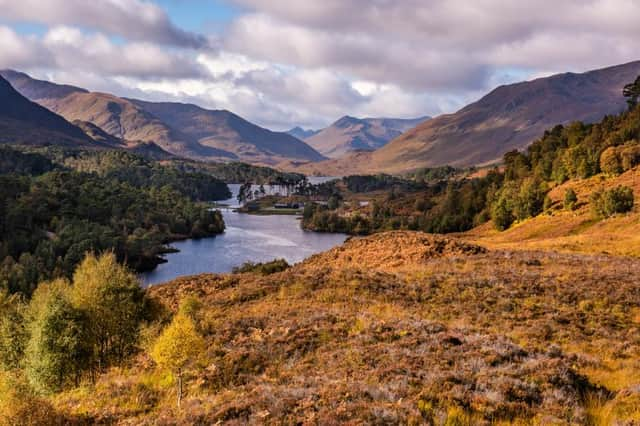Rewilding can help Scotland fight climate change and boost the economy – Steve Micklewright


Affric Highlands is an ambitious 30-year project to rewild a vast area of the Highlands. It brings together a broad group of landowners, local communities and others to help nature recover across a potential 500,000 acres, ranging from Loch Ness to Kintail and encompassing Glens Cannich, Affric, Moriston and Shiel.
Led by Trees for Life and three years in the making, Affric Highlands will be the biggest rewilding project in the UK.
Advertisement
Hide AdAdvertisement
Hide AdIt will see landowners and local people working together through a grassroots, community-driven approach to connect areas of rewilding land, with work due to begin next year.
At its unveiling in Drumnadrochit yesterday evening, the initiative joined Rewilding Europe’s elite group of continent-wide flagship rewilding projects which range from Swedish Lapland to Italy’s Central Apennines.
Affric Highlands has community involvement at its heart. There have been wide-ranging discussions with local people, with more planned. A diverse group of 20 landowners covering at least 25 per cent of the project’s total area and six organisations are already on board.
As well as connecting habitats, Affric Highlands will bring people together to restore nature, and strengthen connections between communities and their local wildlife.
The aim here is to breathe life into the huge potential of the Highlands to help nature return in a big way – and so create social and economic opportunities, while making a leading contribution to tackling the global climate and nature emergencies.
It’s a vision of hope. And there is no time to waste because the clock is ticking.
The United Nations is warning that the world faces a climate abyss – a crisis it describes as code red for humanity. We face an overlapping nature emergency – with ecosystems being shredded and more than half of the globe’s wildlife wiped out in living memory.
This broken relationship with the planet is contributing to a worldwide health crisis, and helps viruses like the one behind Covid-19 to leap more easily from other species to humans.
Advertisement
Hide AdAdvertisement
Hide AdAs Scotland prepares to host the UN’s Cop26 climate summit in November, the calls for urgent action – including on reducing fossil fuel emissions – are growing louder.
Rewilding – the large-scale restoration of nature – offers one solution, and a powerful one. It can help soak up carbon dioxide and address impacts of climate breakdown such as flooding – while reversing biodiversity declines and creating opportunities for local communities and economies.
Yet although Scotland could be leading the way, it remains one of the world’s most nature-depleted countries. Many species are declining or extinct. Our forests, peatlands and river systems are in trouble. Our rural and coastal landscapes support fewer people than previously.
Our politicians need to step up. But meanwhile – as shown by Affric Highlands and the many rewilding projects emerging across Scotland – people aren’t waiting.
By working with nature instead of against it – by restoring life to our hills, glens, rivers and seas, and by showing global leadership – we can offer new opportunities to local communities and economies, and hope for ourselves and for future generations.
Find out more about Affric Highlands at treesforlife.org.uk/affric-highlands
Steve Micklewright is chief executive of rewilding charity Trees for Life
A message from the Editor:
Thank you for reading this article. We're more reliant on your support than ever as the shift in consumer habits brought about by coronavirus impacts our advertisers.
If you haven't already, please consider supporting our trusted, fact-checked journalism by taking out a digital subscription.
Comments
Want to join the conversation? Please or to comment on this article.
